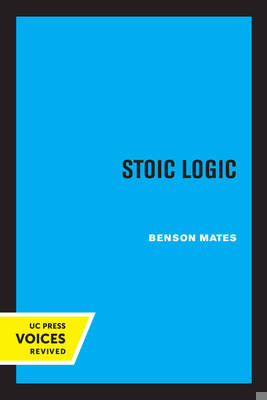
Je cadeautjes zeker op tijd in huis hebben voor de feestdagen? Kom langs in onze winkels en vind het perfecte geschenk!
- Afhalen na 1 uur in een winkel met voorraad
- Gratis thuislevering in België vanaf € 30
- Ruim aanbod met 7 miljoen producten
Je cadeautjes zeker op tijd in huis hebben voor de feestdagen? Kom langs in onze winkels en vind het perfecte geschenk!
- Afhalen na 1 uur in een winkel met voorraad
- Gratis thuislevering in België vanaf € 30
- Ruim aanbod met 7 miljoen producten
Zoeken
Omschrijving
Stoic Logic by Benson Mates is a groundbreaking study that reconstructs the logical system of the early Stoic philosophers, particularly Zeno, Cleanthes, and Chrysippus. Long overshadowed by Aristotelian syllogistic, Stoic logic was in fact a distinct and highly sophisticated propositional system. Mates demonstrates how the Stoics developed truth-functional accounts of logical connectives, distinguished arguments from conditionals, and built a calculus of inference rules from five basic undemonstrated forms. He also provides a clearer account of the much-debated Diodorean implication, explains the Stoic principle of conditionalization in relation to modern deduction theorems, and investigates the school's claim that their logic was complete. Drawing on fragments preserved in Sextus Empiricus, Diogenes Laertius, Galen, and others, Mates offers a rigorous yet accessible reconstruction that has reshaped scholarly understanding of ancient logic. The book includes new translations of key fragments and a glossary of technical terms, making it an indispensable resource for both philosophers and classicists. By carefully comparing Stoic theories with modern semantics and propositional logic, Mates reveals how much the Stoics anticipated later developments in logic and philosophy of language. Stoic Logic remains a foundational text for anyone interested in the history of logic, Hellenistic philosophy, or the conceptual roots of modern analytic thought. This title is part of UC Press's Voices Revived program, which commemorates University of California Press's mission to seek out and cultivate the brightest minds and give them voice, reach, and impact. Drawing on a backlist dating to 1893, Voices Revived makes high-quality, peer-reviewed scholarship accessible once again using print-on-demand technology. This title was originally published in 1973.
Specificaties
Betrokkenen
- Auteur(s):
- Uitgeverij:
Inhoud
- Aantal bladzijden:
- 156
- Taal:
- Engels
Eigenschappen
- Productcode (EAN):
- 9780520349063
- Verschijningsdatum:
- 23/09/2022
- Uitvoering:
- Paperback
- Formaat:
- Trade paperback (VS)
- Afmetingen:
- 140 mm x 210 mm
- Gewicht:
- 199 g

Alleen bij Standaard Boekhandel
+ 135 punten op je klantenkaart van Standaard Boekhandel
Beoordelingen
We publiceren alleen reviews die voldoen aan de voorwaarden voor reviews. Bekijk onze voorwaarden voor reviews.









